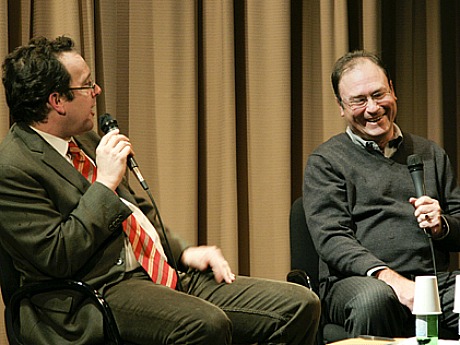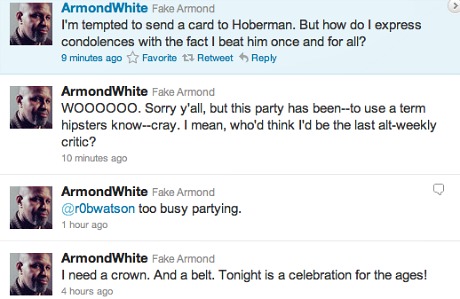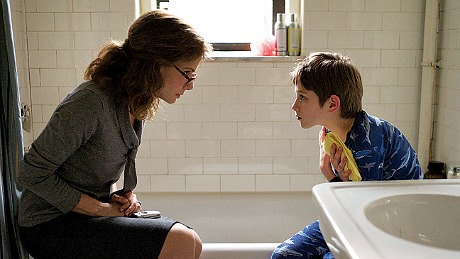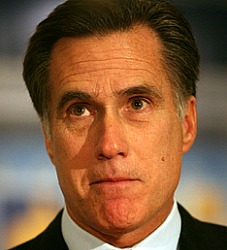I really adore Judy Greer‘s voice. And her work in The Descendants, of course. (It would be so great if she could be the female Demian Bichir.) I’ve enjoyed pretty much everything she’s ever said or done, really.
Day: January 4, 2012
Hoberman Whacked
Longtime Village Voice film critic Jim Hoberman has been cut loose. Hoberman had been a Voice critic since 1983 1978, a staffer since ’83 and the paper’s senior critic since ’88. The news was initially posted at 5:37 pm eastern, and then New York/”Daily Intel”‘s Joe Coscarelli posted it at 6:08 pm. This makes Karina Longworth the only noteworthy V.V./L.A. Weekly film critic left on the payroll.

“To celebrate his 30th anniversary as a film critic at The Village Voice, on 1.5.08 the Museum of the Moving Image presented a conversation with Hoberman moderated by New York Times film critic A. O. Scott.”
“I’ve seen a lot of people lose their jobs there in the last five years,” Hoberman told Coscarelli. “I would be disingenuous to say I hadn’t considered the possibility that this would happen to me eventually. I was shocked, but not surprised.”
Remember “White Rips Hoberman, Dart“?
Here’s an mp3 of a chat between Hoberman and N.Y. Times critic A.O. Scott during a Hoberman tribute at the Museum of the Moving Image on 1.5.08.
Here’s a blunt, fair-minded bemoaning of the post-Hoberman situation by Indiewire‘s Anthony Kaufman.
The correct spelling of the Hogan’s Heroes thing: “Hoohhhhberman!”
And here are nine memorable Hoberman quotes from Some Came Running‘s Glenn Kenny. Can I be honest in a Lee Marvin sort of way? The only Hoberman riff on this list that I fully agree with (and enjoy) is the one about Blue Velvet. The florid praise by way of ecstatic description of the wilder portions of Inglorious Basterds seems excessively geeky and cul-de-sacky. I know what Inglorious Basterds is. I sat through that fucker twice, and I don’t think I could stand it a third time. You can’t fool me or push me around. Those days are over.
High Noon forever! And Rio Bravo…well, it’s pretty good here and there. Especially the silent part with grubby Dean Martin and the coin and the spittoon and that look of total disgust on the Duke’s face. But why the hell does Martin knock him cold with a piece of wood?

Shocked, Partially Burned
Last night I bought and watched the Criterion Bluray of Alfred Hitchcock‘s The Lady Vanishes (’38). I realize that it’s one of Hitch’s best known and most respected British-period films (along with The 39 Steps) and that the mystery-on-the-train portion is expertly done. But I didn’t realize until last night that the first 26 minutes or so — over 25% of the running time — are quite boring and mostly superfluous.
The film begins with several British train-travellers stuck in an Eastern European ski lodge while the tracks are being cleared following an avalanche. And for 26 or 27 minutes all Hitchcock does is piddle around with character introduction, atmosphere and some light comedy that isn’t the least bit comedic. “What the bleeding hell?,” I was muttering to myself. “This is interminable. When does the moving-train stuff begin? I can’t take much more of this.”
It’s against the rules of the pre-Rebecca chapter of the International Society of Hitchcock-Worshipping Dweebs to mention this portion so they’ve ignored it in their reviews of the Criterion Bluray. What stunningly boring first act? The entire film is brilliant, and anyone claiming otherwise is to be pitied, or at the very least needs to watch it again. Am I the only critic-columnist to stand up like Lee Marvin and plainly state that over 25% of this Hitchcock classic is bullshit? If some Dave Kehr-level critic has declared as much I’d love to see the essay or article.
Only Now
I typed some rambling reactions the day after seeing Extremely Loud & Incredibly Close on the night of December 8th. I had to wait for the embargo date to run my review, but I didn’t post several thoughts because I didn’t want to spoil. But the film has been out for almost two weeks now so here are portions that I wrote on 12.9. I’m not going to review the basics so there’s no point reading this if you haven’t seen the film. Those who haven’t are advised that SPOILERS are contained herein:

Reaction #1: “I loved the shrugging of the shoulders bit shared by Tom Hanks and Max Von Sydow. I didn’t think that Von Sydow was that perfect or brilliant or (like I’ve been hearing) a drop-dead winner of the Best Supporting Actor Oscar but he’s obviously quite good, given what was on the page.”
Reaction #2: “I felt that Hanks’ character was presented as almost too supportive, too cheery, too loving, too physically demonstrative ….there seemed to be this mandate that the man had NOTHING BUT JOYOUS ALPHA LOVE pouring out of him each & every waking second. We all know that about Hanks (i.e., he’s very kind and likable) but it would’ve added to the film, I feel, if we could have seen him do something else or radiate something else besides LOVE and GAMES and HUGS all the friggin’ time…God!”
Reaction #3: “I loved the Jeffrey Wright scene in Act 3 because it’s one of the very few in which Thomas Horn‘s Oskar isn’t beating everyone to death with his hyper, ultra-urgent Asperger’s personality. It’s so welcome when the calm and inquisitive Wright settles Oskar and the whole movie down with exquisite conveyances of what and who this man is — his humanity, his sensitivity, his ordinary-ness, his decency.”
Reaction #4: “The gentle make-out affection scene between Wright and Viola Davis at the end…is that supposed to be happening after Oskar’s Sunday night visit to Wright? As in ‘they got back together’? He’s her ex-husband, she says earlier in the film. And he’s moving out when we first meet Viola. So they got back together because of Oskar’s visit? Or the affection scene was a flashback?”
Reaction #5: “And I’m a little confused as to why Viola blew Oskar off the first time he visited. Yes, she was feeling gloomy and depressed and didn’t want to deal with a kid looking for a lock that might fit a key, etc. But he’s a kid and he came for a reason and…she couldn’t be bothered because she was breaking up with her husband? Okay, whatever. Seems dismissive. And why did Oskar want to hug her exactly? That was odd.”
Reaction #6: “And I want to make sure I have the actions of Sandra Bullock‘s mom character straight in my head. Unknown to Oskar the whole time, she went out and did investigative or preparational spade work on his behalf, telling all the various Blacks that he’d be visiting them soon, etc.? And she kept this a secret because she wanted him to feel as if he was doing this all on his own, to give him a sense of manly responsibility and discovery? It seems strange. She tells him at the end anyway so….why did she help him covertly?”
Reaction #7: “Oskar has issues with his mom. He wishes she had died on 9.11 instead of Hanks, he tells her, and she tells him she agrees — she wishes that too. But why the hell does he decide that she shouldn’t hear the phone messages? That struck me as selfish and rather cruel. People who’ve lost someone always want to know. They want to know about the departed’s last moments of life, and how they were at the end and how it happened. They always want remnants, even if they hurt. Did Oskar ever play the messages for her?
Reaction #8: “I wanted Oskar to have a slightly older or slightly younger non-Aspergers brother who could calm things down and speak for the audience a little bit by saying every so often, ‘Whoa, okay… wait a minute. Let’s take things down a notch.’ A voice of annoyance and average reason and normality. A voice that would occasionally say, ‘Will you take five minutes and shut the fuck up, Oskar? Can you at least do this for two minutes? Finding the lock for the key is something you have to do, I get that, I feel it as much as you do, he was my dad too…but your hammer-driving-a-nail-into-wood personality is driving me up the fucking wall!’
Reaction #9: “Eric Roth was hired to make the book work in cinematic form and to lend his customary eloquence and taste — his sense of what’s right and true. But he had to adapt the book. And he had to run with the Oskar character as created. I get that, and as far as I can tell he did a fine job. But how come none of the book reviews that I’ve read this morning mention Aspergers? They all say he’s incredibly bright and earnest but…”
Reaction #10: “I have two questions about the death of Hanks’ character. One, he’s on the phone in message #6 saying ‘Are you there? Are you there?’ and then bang…Oskar looks at the TV and the South Tower is collapsing. So obviously he went down with the building. But we see him free-falling also. A closeup, a shot of a man’s body falling, and the final shot of Hanks falling right into the camera from above. This is supposed to be a vision in Oskar’s head, but Oskar knew (after he listened to the messages) that his dad went down with the building so how or why would he think otherwise? Doesn’t make sense.”
Reaction #11: “As the film begins there’s a close-up representation of how it was for Hanks as he fell. It looks like this footage was shot in a studio with a really big fan making his clothes ripple. But Hanks’ character was travelling about 150 mph — the wind-shear factor would have been a lot more severe.”
Stop Pigeonholing Shannon
I decided that Take Shelter‘s Michael Shannon was a cool guy a little more than three years ago. The decision happened during a Manhattan q & a for Revolutionary Road with Glenn Kenny moderating and Shannon and costar Kate Winslet answering questions. I asked a mildly off-the-charts question, and I was impressed by how Shannon answered it.
Since Revolutionary Road happens in 1955, I asked why Winslet and Leonardo DiCaprio‘s characters were so depressed about their suburban lives when all they had to do was get on a train and go to Manhattan and catch all those great 1955 plays and films, and then hit the Copacabana for drinks. East of Eden, The Ladykillers, Richard III, Kiss Me Deadly, Pather Panchali, Rebel Without A Cause, Marty, Picnic, The Big Knife, Diabolique, The Rose Tattoo and Oklahoma! in blazing 70mm ToddAO at the Rivoli. Plus they could light a candle of some kind in Darien by joining a book-reading group or a local theatre company.
Winslet thought my question was horseshit, but Shannon got what I was on about and went on for a bit about East of Eden and the climate of 1955, etc.
It was then that I realized that Shannon was a man of exceptional smarts and vision. He should play brilliant scientists and scholars and the like, and not just weird schizo guys, which is all Hollywood seems to cast him as. (They’ve got him playing General Zod in Zak Snyder‘s Superman remake.)
Which is why I was irritated this morning when MTM.com’s Josh Horowitz sent me an “Adorable Things” interview with Shannon.
“Not funny, Josh,” I wrote. “It’s an interesting experiment in blank irony, dead air, dead space.
“‘Are you making fun of me?’ Shannon asks. Yeah, you are. You’re basically saying, ‘This is guy is dark and creepy and hostile under the skin, and we’re going to accentuate that — hah hah! — by pretending he’s the cutest little bunny imaginable!’ Shannon is cool enough enough to roll with the experiment, of course. But then he says ‘I don’t get golden retrievers’? My favorite dog in the world.
“You know I like/love a lot of your stuff, Josh, but not that this bit….sorry. And I’m saying this as a genuine fan of the guy for a long time, particularly his work in Take Shelter and Revolutionary Road. I hate it when movies casts unusual looking, non-soothing guys like Shannon as villains.”
Fetes, Don’t Fail Me Now!
It suddenly hit me this morning that I’m getting a little bit tired of Martin Scorsese being tributed all the time. The guy spends one-third of his life accepting awards and tributes, one-third doing what he can to raise consciousness about classic films and film preservation (and hail to him for that), and one third making docs and features. I love Marty as much as anyone in the dweeb fraternity, but something snapped when I saw this headline. I said to myself, “Jesus Christ…again?”

Scorsese accepted an award at the Marrakech Film Festival last year, which I happened to attend courtesy of Jessica Uzzan. I remember sitting there and scowling and muttering to myself, “Another fucking Scorsese tribute?”
This is part of my general feeling that he needs to put away the tuxedoes and give all the tributes a rest and “go guerilla” and find his narrative moviemaking soul again. The best Scorsese film since The Departed was Letter to Elia — so much more direct and moving and personal than Hugo, which was technically very impressive with a very affecting finale, but was basically a paycheck movie — let’s face it.
Please, God — spare us from Scorcese’s Silence!
Son of “The Material Isn’t There”
Today’s news about Hugh Jackman signing to star in an Aaron Sorkin-scripted Broadway Houdini musical is an opportunity to re-run last year’s piece about the dramatic weakness of the life of Harry Houdini. The only way to make any Houdini piece work is to abandon his actual history and make something up.

In the late ’80s and early ’90s the late Stuart Byron and I had a small business called re:visions that sold analyses of stalled or otherwise troubled film projects. 23 years ago we co-researched and co-wrote an exhaustive 36-page analysis about why Rastar Prods. (the Columbia-based filmmaking company run by the legendary Ray Stark) had repeatedly tried and failed to get its own Houdini movie before the cameras in the ’70s and ’80s, despite having commissioned scripts from the highly skilled James Bridges, Carol Sobieski and William Goodhart.
Our opinion, in a nutshell, was basically “forget it.” We delivered our opinion on page 4, as follows:
“We began our immersion into the Houdini material under the hope that we’d strike oil, some structural flaw or hidden theme that everyone had missed, and thus resurrect the [Houdini] project as it was originally conceived. But after slogging through three Houdini biographies, two-and-a-half stage treatments done for Ray Stark, all of the scripts (some Rastar-owned, some not) and treatments, and various research materials assembled in the Rastar riles through the years, we came to a conclusion which surprised us — certainly one for which we were unprepared.
“The material isn’t there.
“It is not the fault of James Bridges, Carol Sobieski or William Goodhart that none could write a producible script. Harry Houdini may have had a fascinating career. His stage act may have been the biggest knockout of his day. And he may have had, on some deeply repressed level, strong inner conflicts that render him a subject for psychological discourse.
“But he did not lead an interesting life. Indeed, of all the major celebrities of the 20th Century, it could be argued that Harry Houdini led the dullest and most uneventful off-stage existence. Houdini may have led a life that, to him, was incandescent, but reading about requires great amounts of coffee and fortitude. The dramatic dullness is unrelenting. We wished that once, just once, Harry Houdini had failed in some performance and been publicly humiliated. Or that he suffered some crisis of confidence. But it never happened.
“Houdini’s is an example, in fact, of the sort of life in which, dramatically speaking, nothing happens.
“He never fell in love with a woman other than his wife (this no adulterous conflicts or guilt, leading to some cinematic flashpoint). He did not have to leave his country and become an exile. He had no serious rivals or feuds (except for the wars of rhetoric between himself and the spiritualists, fought with terminology and metaphor of an obscure, hard-to-grasp nature). His career never stalled due to some interruptus, like having to fight in World War I, or suffering injury or serous illness, or becoming an alcoholic or dope addict.”
The whole reason for focusing on Harry Houdini is the metaphor of escape, and the fact many of his escapes were done in “real” environments and not as a showbiz presentation.
Romney vs. Irish Setter
A Vanity Fair excerpt from “The Real Romney“, a forthcoming book by Michael Kranish and Scott Helman, contains an intriguing story about likely Republican presidential nominee Mitt Romney. It happened during a family road trip 28 and 1/2 years ago, when Romney was 36.


“The destination of this journey, in the summer of 1983, was [Romney’s] parents’ cottage, on the Canadian shores of Lake Huron. The white Chevy station wagon with the wood paneling was overstuffed with suitcases, supplies, and sons when Mitt climbed behind the wheel to begin the 12-hour family trek from Boston to Ontario.
“As with most ventures in his life, he had left little to chance, mapping out the route and planning each stop. Before beginning the drive, Mitt put Seamus, the family’s hulking Irish setter, in a dog carrier and attached it to the station wagon’s roof rack. He had improvised a windshield for the carrier to make the ride more comfortable for the dog.
“Then Mitt put his sons on notice: there would be pre-determined stops for gas, and that was it. Tagg was commandeering the way-back of the wagon, keeping his eyes fixed out the rear window, when he glimpsed the first sign of trouble. ‘Dad!’ he yelled. ‘Gross!’ A brown liquid was dripping down the rear window, payback from an Irish setter who’d been riding on the roof in the wind for hours.
“As the rest of the boys joined in the howls of disgust, Mitt coolly pulled off the highway and into a service station. There he borrowed a hose, washed down Seamus and the car, then hopped back onto the road with the dog still on the roof.
“It was a preview of a trait he would grow famous for in business: emotion-free crisis management. But the story would trail him years later on the national political stage, where the name Seamus would become shorthand for Romney’s coldly clinical approach to problem solving.”
Anyone who would put a dog inside a carrier strapped to the roof of a car moving 70 mph for hours and hours is one cold fuck of a human being. I would never do that to a dog, even to some stray I’d just found on the side of a road. Seamus is a social-political metaphor, all right. I trust I don’t have to explain it.
Over Is Over
Most of us understand what the terms “suspended animation” and “suspended sentence” mean, but a Presidential candidate announcing that he/she is “suspending” their campaign implies they’re putting it on hold as opposed to shutting it down. They’re not turning off the DVD player and heading out for a bike ride — they’re hitting freeze-frame and keeping the TV on in case an unforeseen opportunity presents itself down the road.
Which in the case of Michelle Bachmann‘s over-and-done-with campaign is a chickenshit dodge.
If you’re having relationship problems, your girlfriend might say “so you wanna break up or what?” And you might say “well, not exactly…what I had in mind is that we should suspend our relationship as opposed to throwing it into the wastebasket. Let’s freeze it in the space-time continuum in case we want to return to it next month or next year…okay?” To which she would say, “You know, this is one of the reasons why we don’t get along. You are so SO full of shit sometimes.”

